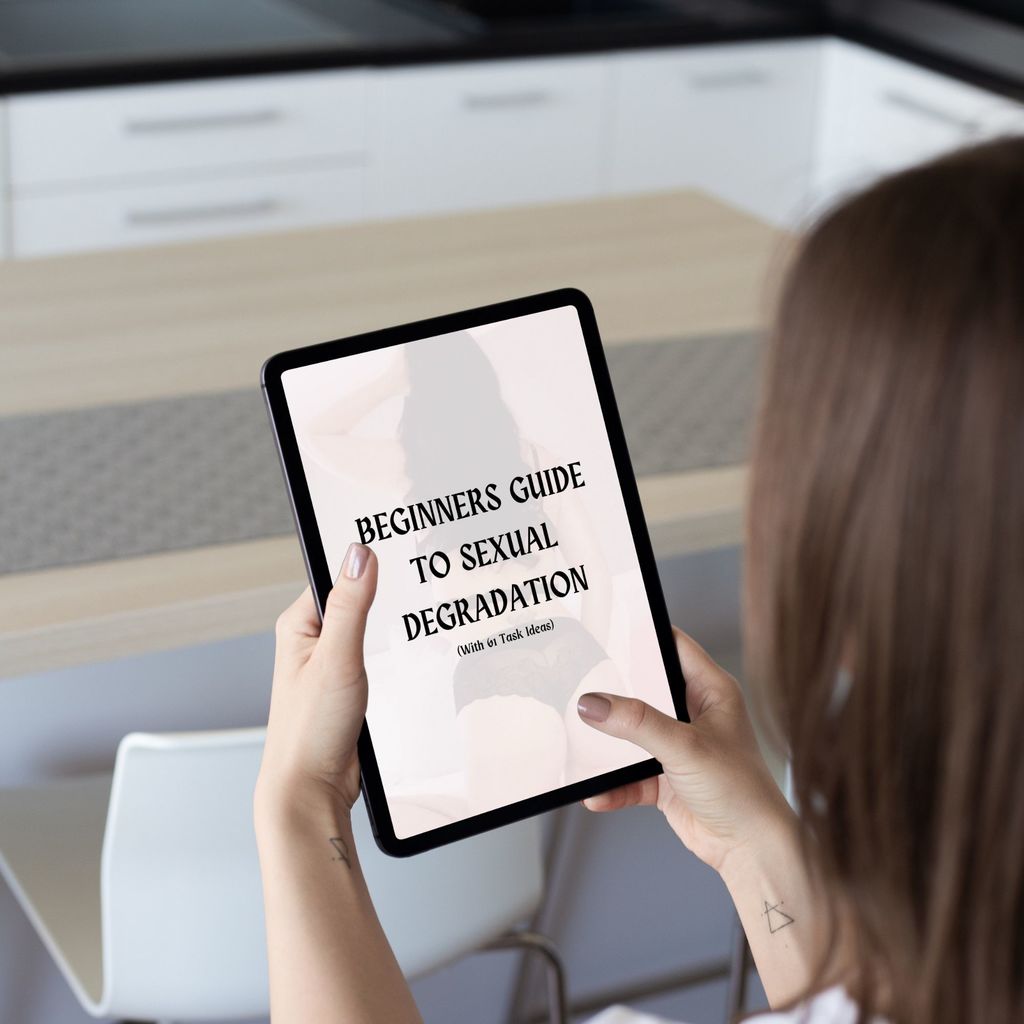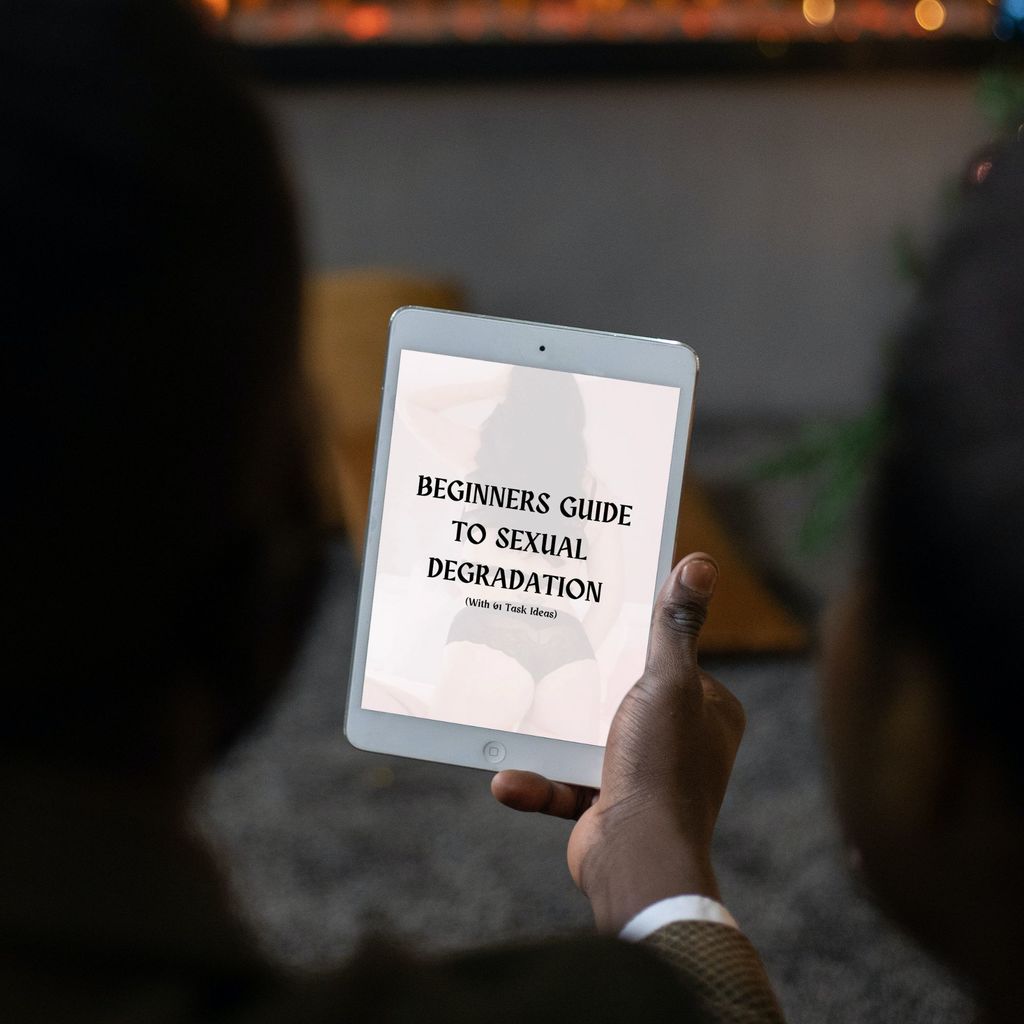Beginners Guide to Sexual Degradation with 61 Degradation (Humiliation) Task Ideas
Beginners Guide to Sexual Degradation with 61 Degradation (Humiliation) Task Ideas
Couldn't load pickup availability
This Beginners Guide to Sexual Degradation is the culmination of over seven years of journey into this Sexual Degradation fetish lifestyle. This guide will introduce you to the lifestyle. This item includes 61 of our favorite Sexual Degradation (Humiliation) task ideas.
It is important to note that Sexual Degradation or Humiliation is a consensual activity in the context of BDSM, Kinky, DDLG, and Fetish lifestyles involving adults and should always involve clear boundaries and communication.
Beginners Guide to Sexual Degradation Contents
Title
Beginners Guide to Sexual Degradation (22 pages with information on sexual degradation from our collection)
Contents include:
- Sexual Degradation Defined
- Why People Like It?
- Is it an Abuse?
- Common Vocabulary (10)
- Roles
- Sexually Degrading Task Ideas (61)
- Caution (2)
Format: 4" x 6" Non Editable PDF.
What is Sexual Degradation (Humiliation) in the context of BDSM lifestyle?
In the context of the BDSM lifestyle, sexual degradation (also known as "humiliation play") refers to consensual acts or language intended to demean or belittle one partner in a sexual or erotic context. This can include verbal degradation, such as name-calling or insulting language, and physical acts, such as forcing a partner to perform certain tasks or wear certain clothing.
It's important to note that sexual degradation is a consensual activity that should only be performed between adults who clearly understand the activity and have agreed upon it. It's also important that the activities should never involve non-consensual or degrading behavior and should always be done within the boundaries of the law.
Why do people like it?
There are various reasons why some people may be drawn to the BDSM activity of sexual degradation or humiliation play. For some, being degraded or humiliated may be sexually or emotionally fulfilling. For others, surrendering control or submitting to a dominant partner may be exciting or appealing. Additionally, some people may find the activity a way to explore different aspects of their identity or push boundaries in their relationships.
Some people enjoy the power dynamics in BDSM and may find pleasure in submission or control. It can also be a way to explore different aspects of their personality or to challenge themselves. It's also important to note that some people might enjoy the role play and the fantasy aspect of it; it allows them to escape their everyday lives and explore different identities.
What Sexual Degradation (Humiliation) is NOT?
In the context of the BDSM lifestyle, sexual degradation (or "humiliation play") is a consensual activity that is intended to demean or belittle one partner in a sexual or erotic context, but it is not:
- Non-consensual: Any form of sexual degradation or humiliation not agreed upon by all parties involved is non-consensual and unacceptable. It's important to have open and honest communication, set clear boundaries, and be aware of your and your partner's limits.
- Abusive or harmful: Any form of sexual degradation or humiliation that causes physical or emotional harm to any party involved is unacceptable. It's important to prioritize the safety and well-being of all parties involved and never engage in non-consensual or illegal activities.
- A way to justify discrimination or prejudice: Sexual degradation or humiliation play should not be used as an excuse to discriminate against someone based on their race, gender, sexual orientation, or any other aspect of their identity.
- A way to escape from problems: Some people might use sexual degradation or humiliation to escape their problems, but it's important to remember that it's not a solution for underlying issues.
Note: It's important to remember that everyone's limits and interests are different; respecting them and engaging in any activity only if it's consensual, legal, and safe for all parties involved. It's also important to seek professional help with any concerns or issues.


















